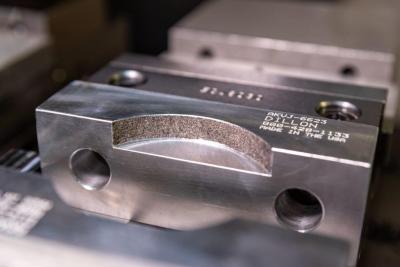
Dillon Manufacturing, Inc. introduces vise jaws with exacting tolerances (+/- .002” in all dimensions, including flatness), with machined work surfaces to fit the contours and curves of the workpieces. Available in 1018 steel, stainless, 6061 aluminum, or specified alloy materials, in standard or custom blanks. Soft jaws or hardened (heat treated) jaws in HD or HDL vises. Made in the USA in ISO 9001:2015 facilities, with industry leading lead-times. Dillon Vise Jaws are available with industry standard hole patterns that fit most manufactured vises including Chick, Kurt, TE-Co, Toolex, and Palmgren.
Carbinite coating can be added for improved gripping after the Vise Jaws are machined to specifications. Comprised of wear resistant carbide alloys that increase grip to enhance mill performance, Carbinite coatings display exceptional bond strength without annealing or distortion.
Contact Details
Related Glossary Terms
- alloys
alloys
Substances having metallic properties and being composed of two or more chemical elements of which at least one is a metal.
- annealing
annealing
Softening a metal by heating it to and holding it at a controlled temperature, then cooling it at a controlled rate. Also performed to produce simultaneously desired changes in other properties or in the microstructure. The purposes of such changes include improvement of machinability, facilitation of cold work, improvement of mechanical or electrical properties and increase in stability of dimensions. Types of annealing include blue, black, box, bright, full, intermediate, isothermal, quench and recrystallization.
- milling machine ( mill)
milling machine ( mill)
Runs endmills and arbor-mounted milling cutters. Features include a head with a spindle that drives the cutters; a column, knee and table that provide motion in the three Cartesian axes; and a base that supports the components and houses the cutting-fluid pump and reservoir. The work is mounted on the table and fed into the rotating cutter or endmill to accomplish the milling steps; vertical milling machines also feed endmills into the work by means of a spindle-mounted quill. Models range from small manual machines to big bed-type and duplex mills. All take one of three basic forms: vertical, horizontal or convertible horizontal/vertical. Vertical machines may be knee-type (the table is mounted on a knee that can be elevated) or bed-type (the table is securely supported and only moves horizontally). In general, horizontal machines are bigger and more powerful, while vertical machines are lighter but more versatile and easier to set up and operate.

